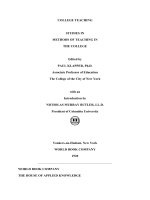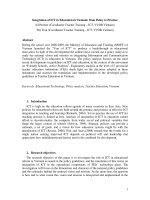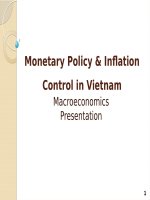College admission test in Vietnam
Bạn đang xem bản rút gọn của tài liệu. Xem và tải ngay bản đầy đủ của tài liệu tại đây (35.6 KB, 3 trang )
Vietnamese teens' thirst for college outpaces country's educational system
By Chico Harlan
Washington Post Foreign Service
Saturday, July 24, 2010
HO CHI MINH CITY, VIETNAM To take the most important test of her life, Le Thi
Hoai Thuong, 18, traveled 38 hours by bus with her father, a rice and corn farmer who
doesn't want his daughter to become a rice and corn farmer.
To fund the journey, the family sold a cow for $730. During the ride, with the air
conditioning broken, Thuong's father fanned her with a rolled-up newspaper. When they
arrived in Ho Chi Minh City, Thuong saw for the first time the place where she hoped to
go to college.
She also got a glimpse of the obstacles facing the growing number of Vietnamese
students with aspirations like hers.
This month, 1.9 million high school seniors in Vietnam took a college admission test.
Reflecting the country's rapid modernization the government seeks to reach worldwide
averages by 2020 a generation of teenagers now views college education as a
fundamental requirement. The problem is, the college education system hasn't grown, or
improved, at a rate commensurate with demand. Vietnam, with 89 million people, has
fewer than 400 colleges and universities. The United States, with 310 million people, has
more than 4,400.
Even below-average schools in Vietnam have Ivy League-like acceptance rates. Although
Vietnam has transformed since the war, reducing its deep poverty with a booming export
economy, a potential roadblock looms for efforts to develop skilled labor, cater to foreign
investors and keep pace with the region. Vietnam's proportion of college students is half
that of Thailand and a third that of South Korea. According to Vietnam's leaders and
development organizations, the country faces a choice: Either the education system
improves, or the improvement here stalls.
A 2009 government report on higher education bemoaned a system that "fails to keep
pace with the socioeconomic development of the country." According to the World Bank,
which last month approved a $456.5 million loan aimed at improving Vietnam's higher
education system, the percentage of professors with doctorates has declined in the past
decade. Universities have a 30-to-1 ratio of students to faculty, high by international
standards.
Within the past few years, the push for college acceptance has turned exam season in July
into a bottleneck. Rural students such as Thuong, who'd never been more than 125 miles
from home before the exam, flock to the big-city testing centers. Hotels offer discounts.
The nationwide train system reduces fares by 10 percent.
Academic steppingstone
Last week, Thuong arrived at the District 9 testing center with 700 others for back-to-
back 180-minute tests. She viewed the moment as pivotal for her and maybe, she said,
for her future children.
Nervous parents waited outside. One father held a pouch of emergency supplies
digestive pills, medicated oil and Band-Aids. An hour into the exam, test-center
volunteers reported that a student had fainted. A few mothers discussed a newspaper
report from Quang Ngai province about an 18-year-old who had killed himself because
he feared he had performed poorly on the exam. None of the mothers had told their
children about the news.
"I'm not nervous," Thuong said. "Going to college will help me with a better job, a better
career. . . . I've seen from my parents and grandparents, farming is really hard."
Going back as far as records and memory would allow, every previous generation in her
family had worked on a farm. Nobody, her two older siblings included, had attended
college. Le Van Do, her father, never thought a child of his would even try.
Thuong, his youngest, was unplanned. When he found out about his wife's pregnancy, Do
worried about losing Communist Party membership on account of its strict two-child
policy. He talked with his wife about abortion. They decided, instead, to report Thuong's
birth with a letter of self-recrimination. The party accepted the apology. But when
Thuong was 7 or 8, her father told her about the reluctance that had attended her birth. He
still thinks this shaped her determined personality.
"There's so much pressure on a third child in Vietnam," Do said. "She's not so smart, but
she's hard-working."
Thuong's siblings, older by 14 and 16 years, dropped out after ninth grade. Thuong's
father attended school until eighth grade, and at 18, he went to war. He fought for the
Communist North against the United States and its South Vietnamese allies, eventually
joining a special operations team.
With his battalion, he arrived for the first time in Ho Chi Minh City then Saigon in
1975, about an hour after its capture by the North Vietnamese army. The next time he
visited the city was this month, when he checked into a dorm room with his daughter for
a three-day stay, paying a discounted rate of $2.63.
"I'm just thinking about how this country has moved forward," Do said. "More
motorbikes and many more people and more skyscrapers. When I was here in 1975, the
tallest building was 17 stories." Now, the tallest building is four times that high.
'It's important to push'
Several students taking the test Thuong included hoped for acceptance into the Ho
Chi Minh City Industry and Trade College, a de facto community college. Acceptance
rates vary based on intended major, but last year, the school accepted 7.1 percent of
business administration candidates and 6.2 percent of its finance and banking candidates.
This year, Harvard accepted 6.9 percent of its applicants, the most selective rate in its
history.
About 70 percent of Vietnamese college applicants, according to government data, take
cram classes. And many high school teachers offer night classes at their homes to
students willing to pay. In Thuong's senior year, she biked 45 minutes every day to
school, attended classes, stayed two more hours sometimes four for cram sessions
and then biked home. When last week's test ended, Thuong said she thought she did well.
She wouldn't get results until the end of the month, but if she failed, she said, she'd spend
the next year working, earning money and studying to take the test again.
"It's important to push and see how far you can go," she said.
Minutes after the test, she met her father outside the testing center. They planned to head
to the bus terminal for the two-night trip back to Thanh Hoa province, near the north-
central coast. Two bus tickets home cost $33.50. Do said that he'd be "a little sad" if his
daughter left for college but that he'd also be proud. If Thuong gets into college, he said,
he plans to take out a loan and raise several extra pigs.
"She will stop the tradition of being a farmer," he said.
Special correspondent Luan Nguyen contributed to this report.









